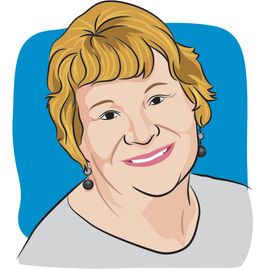- About Us
- Advertise / Support
- Editorial Board
- Contact Us
- CancerNetwork.com
- TargetedOnc.com
- OncLive.com
- OncNursingNews.com
- Terms & Conditions
- Privacy
- Do Not Sell My Information
- Washington My Health My Data
© 2025 MJH Life Sciences™ and CURE - Oncology & Cancer News for Patients & Caregivers. All rights reserved.
Cancer Survivors Look Forward, Not Backward

Jane Biehl is a 12-year survivor of a very rare form of blood cancer, known as myelodysplastic syndrome (MDS). She has enjoyed several exciting careers including a librarian, counselor, teacher, and writer. She loves to write about surviving cancer, overcoming hearing loss and the wonderful benefits of having a hearing-ear service dog.
As a cancer survivor I explain the importance of looking forward to life.
Most people think of a loss as the death of a loved one. In 1969, Kubler-Ross presented groundbreaking research on grief. She discussed the loss of a loved one and outlined specific stages, including denial, anger, bargaining, depression and acceptance. In 1974, she authored the famous book, “Questions and Answers on Death and Dying.”
Kubler-Ross wisely did not put a time limit on these stages. She realized that they are not always in any specific order, and some people never successfully go through the stages to acceptance. Staying in the stage of anger is quite common.
As time went on, she acknowledged that these losses and stages of grief could be applied to any form of catastrophic personal loss, such as a job, income or home. One of the least recognized losses is when an accident or illness takes away our hearing, our vision, our ability to walk, our ability to work and our way of life, which may be gone forever.
People with cancer fall into this category. Some people do recover and go back to their old schedule and way of life. Others have residual side effects that prevent them from ever doing this. They slowly began to realize they will never have their old physique and energy back again.
I suffer quietly because I do not want to sound ungrateful for the many years of great doctors, new medications, and support systems that have kept me alive. However, as a result of those pesky blood cells not doing their job, I diminished my savings, was forced to quit two jobs I loved, and my body does not respond the way I want. I thought I was coping well and did not realize that I have been mourning my past life all along.
The realization struck me while watching the popular television show NCIS. A Marine, severely injured in Afghanistan, returned to the U.S. feeling bitter and upset. He isolated himself and refused to allow anyone to help him in the rehabilitation hospital where he was healing. He was unable to walk without a crutch and suffered from post-traumatic stress syndrome. Seven out of 100 veterans return with post-traumatic stress syndrome, and he was one of them. Through a series of events, especially seeing how much he was hurting his beloved daughter, he recognized that while he might never walk normally, he could still do other activities such as playing in a marine band. He slowly had an attitude adjustment as he told the main character of the show, Gibbs, that, “I was trying to be who I was but needed to figure out who I am now.”
Although I had changed my passions from counseling and teaching and now am writing, I was still mourning. I wanted things the way they used to. What I needed to do was decide who I am now and in the future. I read another quote by Roger Lee: “Nothing lasts forever, and every chapter ends. So be patient and stay strong, because very soon a better and brighter chapter will begin.” This is the part often missed in mourning. I have been too busy looking at the past and wishing for my old energy and body back. I needed to focus on the future. There was another exciting chapter out there and it was up to me to start it, and I should not forget.
For more news on cancer updates, research and education, don’t forget to subscribe to CURE®’s newsletters here.
Related Content:



